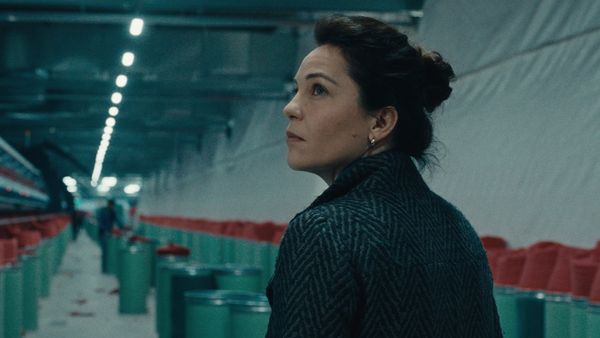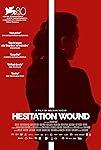Eye For Film >> Movies >> Hesitation Wound (2023) Film Review
Hesitation Wound
Reviewed by: Jennie Kermode

As Selman Nacar’s film opens, the bus rolls into Uşak, carrying Musa (Oğulcan Arman Uslu), a man whose whole future hangs in that balance. At the end, the camera tracks back out in one slow, graceful movement which sees the city recede until its significance is restored to proper context. It is not the whole world, no matter how commonplace some of its woes might be, and Musa’s story is just one of billions playing out at the same time. Nevertheless, there’s a particularity about Uşak which, whilst we are there, casts a spell. It’s present in Ahmet barak Gurbuz’s meticulously designed soundscape, with its low industrial hums, its dripping, its constant weight. It’s there in Tudor Vladimir Panduru’s exquisite, drably saturated greens and blues. Briefly glimpsed through windows and on hurried journeys, the sky hangs heavy overhead, a storm waiting to break. Everyone can feel the pressure.
At the centre of the storm is Canan (Tülin Özen), a woman who is struggling with her fear of powerlessness and with her fear of exercising power. She is Musa’s lawyer, educated, idealistic, determined to find some means of saving him from life imprisonment despite the fact that his murder trial seems to be more concerned with status than logic, and he himself driven more by emotion than reason, a way of being with which she finds it hard to connect. Her emotion is – as best she can manage it – reserved for her private life. By night she visits the hospital where her mother is on life support, finally able to relax as she lies down by her side like a child. The doctors, however, say that her mother is gone, that there is only a body there now. Her sister Belgin (Gülçin Kültür Şahin) agrees with them. If they don’t act soon, the body’s organs will begin to deteriorate and won’t be able to be donated as their mother wished. Won’t Canan agree to let her go?
The titular hesitation wounds can be seen on Musa’s arms. He has been thinking about killing himself, but doesn’t quite have the courage – or, perhaps, he is still holding onto a flicker of hope, as Canan holds onto the small movement of her mother’s fingers. Both, in their different ways, are unable to come to terms with the everyday unfairnesses of life, and though Canan is vastly more privileged, that seems to impede her understanding more than it advantages her. She hides behind a carefully cultivated professional demeanour, her poise and voice and clothing choices all speaking to control everything she can as precisely as possible. Belgin, who approaches life very differently, finds fuel for her own frustrations in these things, but is taking care of her sister in a way that Canan cannot immediately see.
Özen is superb, a world away from her relaxed, good humoured self, imbuing her character with brittleness and yet making room for sympathy. Şahin makes the perfect foil, bringing equal power to a very different sort of performance. The story unfolds slowly, in observational style, with some of the repetition necessary to show how Canan has become trapped by her ideals. The technical work is first class throughout, but subtly done, so that most viewers will already have fallen into the rhythm of the film before they notice its carefully structured symmetries, its conscious elegance. It is never merely pretty, but finds something very human in a landscape of ruin and neglect. The social corruption evident at Uşak’s core is mirrored in the physical corruption of its architecture and infrastructure.
Screening at the 2024 Muslim International Film Festival, Hesitation Wound is a melancholy piece of cinema but such an accomplished one that it is a delight to watch. Nacar is himself a law graduate and knows his subject matter well, but it is the way he gets under the skin of his characters that really brings the film to life. The result is something special.
Reviewed on: 30 May 2024















